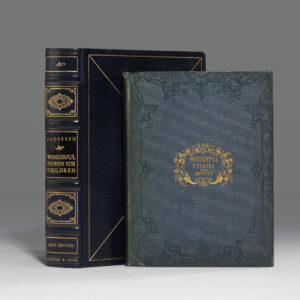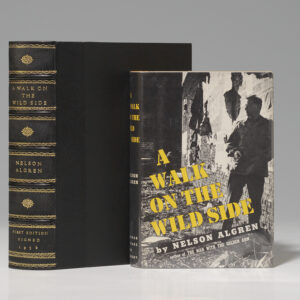Description
AN EXCEPTIONAL RARITY, FIRST EDITION OF PROCEEDINGS OF A BOARD OF GENERAL OFFICERS, HELD BY ORDER OF HIS EXCELLENCY GENERAL WASHINGTON, 1780, THE TRIAL AND EXECUTION OF BRITAIN’S MAJOR JOHN ANDRÉ FOR HIS “SECRET NEGOTIATIONS” WITH THE TREASONOUS BENEDICT ARNOLD IN A PLOT TO HAND OVER WEST POINT—”ONE OF THE KEY EPISODES IN THE WAR OF INDEPENDENCE”
(ANDRE, Major John) (ARNOLD, Benedict). Proceedings of a Board of General Officers, Held by Order of His Excellency General Washington, Commander in Chief of the Army of the United States of America: Respecting Major Andre, Adjutant General to the British Army, September 19,1780. Philadelphia: Francis Bailey, 1780. Slim octavo, modern half red morocco and marbled paper boards, uncut; pp. (i-ii), (1-5), 6-13, (14), 15-21 (1).
First edition of the official proceedings of the board which tried Major Andre, this printing ordered by Congress and issued in Philadelphia, containing an account of the proceedings and the text of key letters from Washington, Andre, Clinton, and Benedict Arnold. Extremely rare.
“Major General Benedict Arnold’s 1780 plot to surrender the American fortifications and garrison at West Point to the British, one of the Revolution’s most dramatic episodes, nearly succeeded. Arnold’s treasonous undertaking failed thanks to a remarkable convergence of events…British commanding General Sir Henry Clinton first negotiated terms with Arnold through ciphers and intermediaries, then insisted on a face-to-face meeting between a trusted subordinate and the turncoat. Clinton wanted to ascertain that Arnold’s proposition was not a ruse to set up Crown forces for an ambush. The Briton he assigned to vet the supposed turncoat was Major John André, barely 30 years old, a dashing adjutant general Sir Henry held in much the same esteem as Washington held the Marquis de Lafayette. A seasoned intelligence officer, André was accomplished, well educated, and by many accounts charismatic…There is no doubting André’s ambition. He had been involved in negotiations with Arnold from the beginning and wanted to guide them to a successful conclusion. The capture of West Point and its 4,000-man garrison could well be the turning point of the war—and of his career…André won his commander’s grudging approval to travel from New York City to the British warship Vulture, anchored in the Hudson about 14 miles downstream from Arnold’s headquarters. André made the trip on a small boat, arriving aboard Vulture on September 20…. Besides locking in Arnold’s price, André obtained from the American details on West Point’s defenses.
“Near Tarrytown on Friday, September 23, three armed civilian roughnecks accosted Andre. One wore a green shirt of the style favored by Hessians fighting for the Crown. Guessing he had stumbled upon compatriots, André admitted to being with the British…André was conveyed under heavy guard to Washington’s headquarters, then at the residence of a family named Robinson. André was next taken to Tappan, a town where the main American army was camped. The patriots confined André in Mabie’s Tavern, for less than a week before a 14-member military court presided over by Major General Nathaniel Greene tried him. The tribunal voted unanimously to convict the prisoner of espionage. André was slow to realize that Arnold’s treachery was going to cost him his life. When he did grasp his situation, he had only one request—that he be shot like a soldier, not hanged, the disgraceful end reserved for spies, traitors, and their ilk. ‘Buoy’d above the Terror of Death by the Consciousness of a Life devoted to honorable pursuits and Stained with no Action that can give me Remorse,’ André wrote to Washington, ‘I trust the request I make to your Excellency at this Serious period and which is to Soften my last moments will not be rejected.’ His prisoner’s request presented Washington with a dilemma. The general’s animus was personal and aimed at Arnold, not at André. Washington had trusted and supported Arnold, rewarding him with the command at West Point, only to have the man respond with “treason of the darkest dye,” a betrayal that cut the general to the quick. Washington prided himself on his ability to judge men, and it mortified him to have been so wrong about Arnold. He desperately wanted Arnold to pay mortally for his treachery…The facts were compelling. André had not come ashore under a flag of truce, a fact he acknowledged. He was engaged in espionage, and he had been captured behind enemy lines out of his military uniform with incriminating documents, making him a spy and not a prisoner of war. The accepted punishment for espionage was the ignominy of death by hanging. Washington concluded he had no other option” (Peter Henriques).
After André was captured, Washington “did not call a drumhead court-martial for the immediate sentence and execution of a spy caught in civilian dress. The American leader named, instead, a board of fourteen general officers [including the Marquis de la Lafayette, Baron Von Steuben, General Knox, and General Greene] to make a careful and speedy examination of Andre” (Freeman, 447). This rare first edition of the proceedings of the board contains not only an account of the hearing but key letters from Washington and others, including Washington’s communication to Congress of the initial events, his instructions to the board, Andre’s letter to Washington describing his actions, the list of evidence concerning West Point, and the conclusion of the board “that Major Andre, Adjutant General to the British Army, ought to be considered as a Spy from the enemy, and that agreeable to the law and usage of nations, it is their opinion, he ought to suffer death.” In addition, there is an appendix containing Andre’s letter to General Clinton attesting that he has received the “greatest attention from his Excellency General Washington, and from every person, under whose charge I happen to be placed;” correspondence between Washington and Clinton; Benedict Arnold’s letter on behalf of Andre to Washington, Andre’s poignant letter to Washington requesting that he be allowed to be shot rather than hung to death. First edition, first printing: with half title. This rare and most desirable first publication of Proceedings was followed by regional printings in New York, Fishkill, Hartford, Norwich and Providence. Only a single example of the Philadelphia edition (without half title) appears in the auction records for the last quarter century. Adams, American Controversy 80-6a. Church 1165. ESTC W28964. Reese, Revolutionary Hundred 65. Sabin 1454. Hildeburn 4048. Howes A241. Gephart 7793. Half title with early owner notation inked over.
Interior quite fresh with faintest foxing, mere trace of marginal paper repairs not affecting text. An especially rare near-fine copy, handsomely bound.



